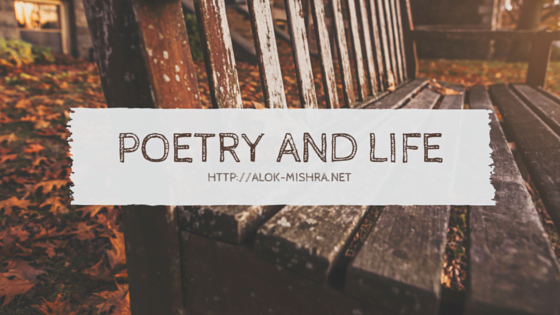Life, Poem and Poetry!
Whenever I am asked to describe life, I begin with mute! Yes, there are reasons behind this pose. To me, life is something that I cannot just have a go as soon as someone wishes me to speak about it. I need time; I need words (indeed, the best ones); I need analogies; I need perfect arguments, and yes, I need metaphors! At last, I speak; I often reiterate the same philosophy – life is a poem… poetry is prevalent in life. You can say that this thought comes to me because I am a poet. However, I have the reasons that will make you believe the same. So, let us compare our dear life with ‘more’ dearer poem (at least to the poets, a poem is far more pleasing than life).
Sorrows,
joy,
rise
and fall;
you're dwarf near time;
your ego, at times, is tall;
love,
hatred,
with folds of poetry
yes,
life is a poem!
AM— Alok Mishra (@PoetAlok_Mishra) December 17, 2015
Considering the Poem:
Phases of a poem: A poem moves in different phases. It starts; it reaches to the zenith of an argument through different logics, and finally, in most of the cases, it demolishes its own argument and falls back to the reality. This is roughly summing up a poem. Do you agree? Remember any poem you have read. You will find the same thing as stated here. I present you the best poem, and fortunately, it’s about life! Just try to analyse the moves of the poem:
“All the world’s a stage,
And all the men and women merely players:
They have their exits and their entrances;
And one man in his time plays many parts,
His acts being seven ages. At first, the infant,
Mewling and puking in the nurse’s arms.
And then the whining school-boy, with his satchel
And shining morning face, creeping like snail
Unwillingly to school. And then the lover,
Sighing like furnace, with a woeful ballad
Made to his mistress’ eyebrow. Then a soldier,
Full of strange oaths and bearded like the pard,
Jealous in honour, sudden and quick in quarrel,
Seeking the bubble reputation
Even in the cannon’s mouth. And then the justice,
In fair round belly with good capon lined,
With eyes severe and beard of formal cut,
Full of wise saws and modern instances;
And so he plays his part. The sixth age shifts
Into the lean and slipper’d pantaloon,
With spectacles on nose and pouch on side,
His youthful hose, well saved, a world too wide
For his shrunk shank; and his big manly voice,
Turning again toward childish treble, pipes
And whistles in his sound. Last scene of all,
That ends this strange eventful history,
Is second childishness and mere oblivion,
Sans teeth, sans eyes, sans taste, sans everything.”
Do I really need to tell you who has composed this poem? Shakespeare was the master of poetry, no doubt. However, our issue in this essay is an analogical survey of life and poem. The poem starts with the birth of a baby, and it ends with a ‘ready to embrace death’ old man. In the middle, he has to play various parts that the poem depicts wonderfully. Focusing on the beginning and the end, we find both the instances reflect the truth of the life – birth and death. Rest all, is nothing but the acting, as Shakespeare wonderfully says ‘all the world’s a stage’. I hope the people who are masters of literary folds have got my ideas well.
Unfolding the poem of life:
The life explained: Life has only two realities – birth and death! All others that come in between are nothing but the illusion (in a philosopher’s sense) or the compulsion (in a sage’s sense) or the evil (to the mind which is practicing detachment) or anything else you might say, but, that’s not as concrete as the birth and death! The prolonged or protracted phases that pull the birth towards death are necessary to complete the journey that’s eternal in a way. Sri Krishna (Lord Krishna) says in Gita,
“जातस्य हि धुर्वो मृत्युध्रुवं जन्म मृतस्य च |
तस्मादपरिहार्येअर्र्थे न त्वं शोचितुमर्हसि || 2-27 ||” (pardon the first word of second line in the shloka, it could not be rendered well!)
The simplified English to read easily for non-Sanskrit readers:
“jatasya hi dhruvo mrtyur
dhruvam janma mrtasya ca
tasmad apariharye ‘rthe
na tvam socitum arhasi”
( Courtesy – Bhagwad Gita As It Is )
Here comes the conclusion:
As poem needs metaphors and similes to drive an idea home, the life needs curves and folds to satisfy itself and to be in a position to embrace death as the ultimate truth. Life is a poem; every good poem is life!
